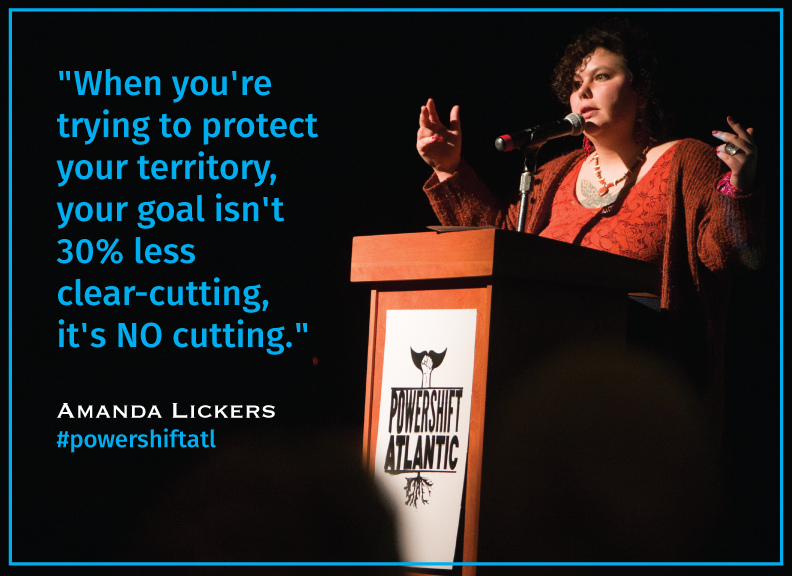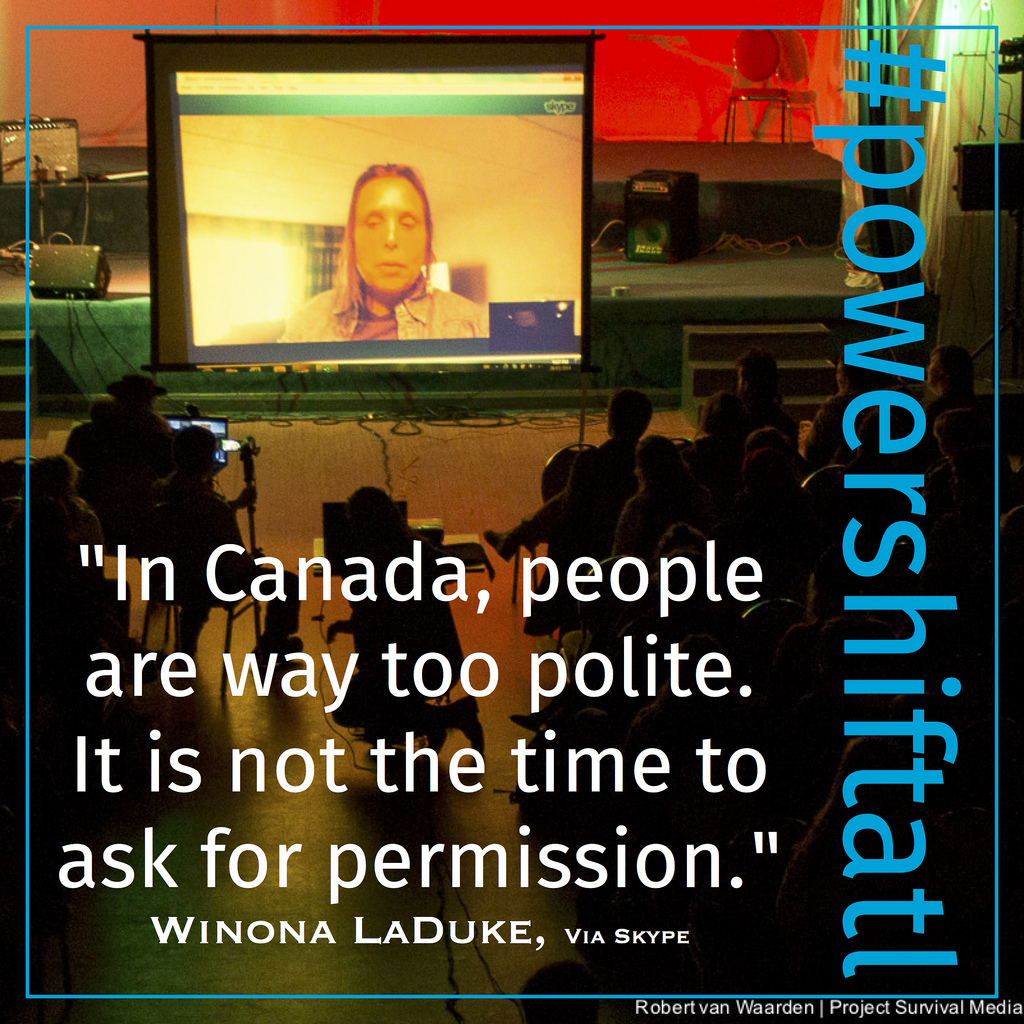At the end of March, PowerShift Atlantic brought together over 500 youth and allies to build up the movement for climate justice. This was the largest gathering of its kind in the region’s history, and it was an historical event to say the least.
PowerShift Atlantic offered participants the opportunity to participate in skills workshops and panel discussions, to hear some amazing keynote speakers and to take creative non-violent direct action in solidarity with frontline communities.
PowerShift opened up conversations on issues like fracking, tar sands, fossil fuel divestment and the Energy East pipeline. People learned skills in media, facilitation, money management, outreach and mobilization and non-violent direct action.
Throughout the weekend there was an art space and art skill shares, including spray painting for change, puppet building, and banner making. There was space for emotions — anger, fear, pain, excitement, eagerness, passion. There was space for skills and techniques to be shared. There was space for difficult discussions — about labour and climate justice, about colonialism and energy production, about Canada’s democracy and its shortcomings.
In so many ways, PowerShift Atlantic was and is much more than a conference about climate justice.
PowerShift Atlantic showed us that climate justice isn’t about pollution, its about polluters.
Climate justice, and working for it, starts with understanding that climate change is not a finite or unique issue — it’s a symptom of multiple systems of oppression and inequality. Climate change is the product of centuries of continued and ongoing colonialism, racism, patriarchy and classism. To truly address climate change we must address these root causes, and we must do so with vigor.
PowerShift offered the opportunity for participants to grapple with ideas like this and to deepen their understanding of climate justice. Every workshop, panel, talk and skill share was grounded in climate justice.
At PowerShift we talked about how colonization didn’t end centuries ago — it continues today: when governments allow corporations to extract (or attempt to extract) fossil fuels from indigenous treaty lands and build mega-projects in the name of renewable energy, while disrupting the ecology and landscape on which indigenous cultures depend.
We talked about how racism didn’t end with the civil rights movement — it continues today: when polluting industrial operations continue in First Nations communities and communities of colour across the country, and companies get away with leaving a toxic mess where their land should be.
We know that classism is alive and well, especially in Atlantic Canada: polluting industries work hard to cut corners and externalize costs so they can provide cheap products. They also externalize their guilt, passing on the blame for unsustainable actions to low-income families.
Many people left PowerShift with a renewed understanding that this is not a fight against greenhouse gases coming out of smokestacks; it’s a fight against the corporate power that keeps us from creating sustainable solutions that work for our communities.
PowerShift Atlantic was a movement building moment
The weekend was full of capacity building opportunities for participants and presenters.
With an understanding that we never know when opportunities for action will come up, we armed ourselves with new skills for action, mobilization and effective communication. Knowing that the movement is only as good as the relationships that keep it going, there was lots of time for old friends and new allies to share ideas and have impromptu conversations.
We saw participants having strategy conversations that made sense for their communities — and we saw one of the first strategy sessions about the Energy East pipeline that included frontline and supporting communities from as far west as Ontario.
We saw 500 people leave PowerShift with new energy, new ideas, new connections and new ways to work for climate justice.
PowerShift Atlantic was about movement strategy
The gathering began with a series of keynote speeches and reflections from movement leaders. In their short address to the crowd about the history of PowerShift, Amara Possian and Robin Tress called on participants to recognize this incredible opportunity for growth and not to underestimate the power of what can be learned and the relationships that can be made.
This intentional and strategic theme carried throughout PowerShift. The layout of the weekend was designed to maximize learning: we laid the foundations of understanding and skill building early in the gathering and built upon that foundation towards the end. We started by grounding ourselves in the concept of justice, and moved forward with discussion of strategy and action.
Through the programming and style of the gathering, PowerShift promoted strategic conversations and actions. Participants talked about pressure points, weak spots and potential opportunities for action in their communities, and on the front lines of climate change and resource extraction. The question on our minds was “how can we work together to fight back?”
Participants held important sessions about the future of the struggles against fracking and pipelines, and fossil fuel divestment. All of these sessions were focused on how to do this work together while taking leadership from frontline communities.

No time was wasted. We recognized how important and unique this opportunity to have 500 climate justice activists and organizers together in one space was, and we did not waste that opportunity.
PowerShift Atlantic was about allyship
Fighting for climate justice starts by understanding the struggles faced by frontline communities. The weekend was about sharing powerful stories of strength in the face of environmental and human suffering. Elevating these voices grounded organisers and participants in the reality of the climate injustices that are affecting communities across the country and across the globe.
PowerShift was about learning skills for allyship, learning how to support frontline communities by taking the time to listen to their stories and to understand their struggles. This isn’t always easy. The weekend opened up tough conversations about environmental racism, neo-colonialism through energy extraction and what it means to be an ally.
This was put into action on Monday, March 31 when a group of PowerShifters and allies rallied outside of the Westin Nova Scotian and occupied the lobby in support several Mi’kmaq women who shut down a meeting of the Maritimes Energy Association.
On March 30, 500 people left with a deeper understanding of climate justice, with a more rounded view of the issues we face within our own communities and with a toolbox bursting with new skills for resistance and resilience.
We don’t know what will come next, and we don’t know what people will do with their new ideas. What we do know is that faces from PowerShift will keep popping up as the fight against fracking continues, and the struggle against Energy East picks up and as we continue to fight for a just and sustainable future.
You can find more stories of PowerShift participants on the PowerShift Atlantic Stories page and can learn more about the story of the weekend through social media and photos.
Robin Tress is the PowerShift Atlantic Coordinator and Catherine MacNeil on the PowerShift Atlantic organizing team.
Photos courtesy of PowerShift Atlantic




